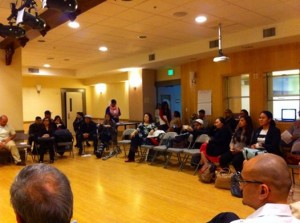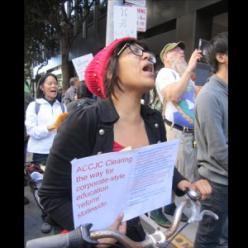SF Community College losing Filipino students due to accreditation crisis
• Possible loss of accreditation driving away hundreds of Filipino students
• Dip in enrollment leads to cuts in resources and teaching time; Philippine Studies program very vulnerable
• Accreditation court battle set for October

Community leaders, teachers, counselors, students, and staff led by Jeanne Batallones, chair of the Philippine Studies Program at City College in San Francisco discuss the current state of the Philippine Studies courses offered at the institution. PHOTO BY ROSE PAQUETTE/INQUIRER.net
SAN FRANCISCO, California — The City College of San Francisco (CCSF) suffered a staggering loss of 712 Filipino American students, from 2,434 from Fall 2011 to a 1,722 today, a hemorrhage largely attributable the college’s possible loss of accreditation.
The majority of the students who did not pursue enrollment at CCSF transferred to Skyline College as a result of the accreditation crisis, said Don “Rico” Gelera, counselor of Tulay, a Fil-Am Student Success Program at CCSF.
Gelera, who handles the transfer requirements and all concerns of international students, explained the phenomenon during a community meeting on April 9 at the Bayanihan Center downtown.
The Accrediting Commission for Community and Junior Colleges (ACCJC) is seeking to strip CCSF of its accreditation this July unless the school came into compliance with accrediting commission standards and eligibility requirements.
Maintain the community college
An immediate casualty of the crisis is the Philippine Studies Department at CCSF, the only academic department in the nation that focuses on the study of Philippine and Filipino history, language, culture, society and the diaspora. It started offering courses in the ‘70s.
“We’re not just fighting for Philippine Studies but to keep the City College as a community college,” said PSD Chair Jeanne Batallones, M.S. “The low enrollment in Philippine Study courses is also due to accreditation,” she said.
Today, Batallones said there are only two classes under Philippine Studies — PHST 20 (The Filipino Family) and PHST 30 (Philippine Society and Culture through Film). The study elementary Pilipino and conversational Pilipino are still offered.
However, Batallones noted that five courses are now cross-listed — ATH 15 (Anthropology)- Philippine Society and Culture; ASAM 8 Filipino American Community; HIST 37 History of the Philippines; IDST 40 Contemporary Issues in the FilipinoCommunity; and IDST 42 Philippine Humanities.
In Spring 2014, Batallones said the class of Pilipino 39A/B was cancelled due to low enrollment. Other reasons for lower enrollment in Philippine Studies are faculty transition and loss of full-time tenure faculty post and under-resourced programs to target Filipino student outreach and retention.
Counselors play a key role for the community college to succeed. According to Batallones, Tulay (or bridge) was started in 2004 to offer various services designed to support student success at CCSF. These services include tutoring, academic counseling, a book loan program, access to scholarships, a computer lab and other student services.
“Now we’re struggling to get our resources, “Batallones said. “Right now, all workers are part-timers and it’s unfortunate. But through Tulay, we’re informing everyone that we exist. “
The Philippine Studies Department also bared that the District wants to further cut 21 department chairmanships including those in Philippine Studies, Multicultural Student Retention, Interdisciplinary Studies, Labor and Community Studies, LGBT Studies, Women Studies, African American Studies and Asian Studies.
Community action needed
Batallones enumerated the following measures in order to to keep the City College as a community college Philippine Studies as a viable course:
– Enrollment campaign
– Replace full-time tenure and faculty position
– Update curriculum and offer new courses
– Promote Pilipino Language Certificate Program
– Develop Philippine Studies Certificate Program
– Develop community partnerships
– Explore changes to Pilipino/Filipino diaspora studies
– Have full-time tenure counseling faculty for Tulay Program
“City College is alive and open,” said Dr. Leo Paz, former department chair. “We’re accepting enrollments, and Fil-Ams should enroll at City College. It’s an important community institution; we have a strong Philippine Studies program, the only department of its kind in the country.“

Protesters call for investigation of accreditation agency that recommended the closure of the community college. FILE PHOTO/INQUIRER.net
Paz said there is an ongoing negotiation between the District and the Philippine Studies Department counselors, unions, the employee relations director, vice chancellor, dean of languages and lawyers to address the concern. “There may be possible repercussions on pay and benefits,” he noted.
Biggest threat
Michael Gonzalez, Ed. D., a CCSF professor of anthropology, who also taught in various institutions such as the University of California in San Francisco, Stanford University and California State East Bay College, said the threat of the loss of the program itself is their biggest challenge.
“The threat is not only on this program itself, but also on around eight more programs,” Gonzalez said. As a rule, he explained, “we need to have more than 17 (students) per class, and there are only two teachers teaching three classes now.” The rest of the teachers at the Philippine Studies department are part-timers.
Gonzalez said that one solution to the problem facing CCSF “is to encourage more high school students to explore the City College and the Philippine Studies program as an avenue for higher education and related learning.”
He told INQUIRER.net that the Philippine studies courses, “give students a better appreciation for their roots and their identities as a people with Filipino heritage. “
“To be competitive, Fil-Am students have to know who they are,” he said. “Our job as teachers is to provide intellectual and academic and socio-psychological support for both continuing higher education or in the workplace.”
But the bigger story, Gonzalez said, is “schools want to essentially be technically-oriented to feed into this economy, and program studies become the target cuts, especially if the enrollment is low.”
Tulay threatened
Maria Joi Barrios-Leblanc, Ph.D., said there was continued growth of the Fil-Am student population between 2001 and 2005. Barrios-Leblanc is a former Dean at the University of Philippines, professor at UCB, and teaches the Pilipino language courses at CCSF.
“We have broad-base community support and have strong Fil-Am presence in CCSF as well as more involvement by the administration and the board and partnerships with other institutions, “ Leblanc said.
A notable drop in enrollment came between 2005-2010. Leblanc said, “The college-wide dip in enrollment was due to increase in tuition fees, budget cuts and cut in course offerings. “
Court battle
A fall trial date (Oct. 27) has been set for a legal battle between the City College and the ACCJC that will last up to five days and is expected to be tried by a judge and not a jury.
City Attorney Dennis Herrera filed a lawsuit in August against ACCJC, alleging that the commission treated CCSF unfairly in its accreditation review process and that there appeared to be a conflict of interest because ACCJC President Barbara Beno’s husband was part of the team that examined the school.
Judge Curtis Karnow, the same judge who will preside over the trial, granted a temporary injunction in January barring CCSF’s accreditation loss until the trial is complete.
A spokesman for the City Attorney’s Office, Gabriel Zitrin, reportedly said Thursday that the injunction indicates that, “The court acknowledges that The City is likely to prevail on the merits of the case.”
Zitrin was quoted as saying the the commission’s actions are “ unlawful,” arguing it does not have legitimate reasons for removing CCSF’s accreditation.
While the commission continues to defend the legitimacy and accuracy of its accreditation findings with respect to City College, Beno stood pat claiming the city attorney’s challenge is an attempt to interfere with the accreditation review process. ACCJC also hopes the court vindicating its evaluation.
RELATED STORY
Filipinos join protest against closure of popular community college














